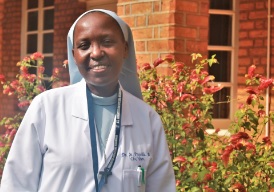
INTERNATIONAL DAY OF THE MIDWIFE 2024: Midwives: A Vital Climate Solution
Today SUNDAY 5TH MAY 2024, Midwives across the world will be celebrating the International Day of the Midwife.
The theme for this year’s celebration is “Midwives: A Vital Climate Solution”.
Climate change is the greatest health challenge of our time. Our warming planet has more heatwaves, more floods, and more natural disasters that significantly impact the health of women and babies—and as such putting resources and efforts into addressing the climate crisis is a matter of extreme urgency.
Midwives & Nurses are a critical cadre, constituting more than 50% of all health workforce and provide over 75% of health services while spending 95% of their time with patients. Midwifery care is critical and a backbone to Reproductive, Maternal, Neonatal & Child Health care services. Midwives constitute 11.6% of the total health workforce for the UCMB network—82% of whom are Enrolled Midwives, and yet with the current available numbers, they represent less than 20% of the expected required midwifery cadre in the network.
The International Confederation of Midwives (ICM) recognises that midwives are a vital solution in adapting health systems to climate change, and lowering carbon emissions overall. Midwives deliver safe and environmentally sustainable health services and are first responders when climate disasters hit.
Globally, healthcare services emit around 5% of greenhouse gases. Emissions result from healthcare facilities’ onsite fuel combustion, emissions from purchased energy, and all other emissions associated with the healthcare supply chain of goods and services. About 80% of healthcare emissions arise from the supply chain, notably from pharmaceuticals, chemicals, and medical devices. These emissions could be reduced by understanding and then limiting causes of emissions, such as inhaled anaesthetics and low-value but high quality care.
So,
By offering continuity of care in communities—e.g. through outreach services, midwives reduce the need for avoidable travel to health facilities, thereby cutting the carbon footprint of healthcare while ensuring accessibility. Evidence shows that continuity of midwife care leads to optimal and safe outcomes by using fewer resources, resulting in less medical waste and a reduced ecological footprint.
The consumption of One-litre diesel emits around 2.7kg of CO2, but depending upon the characteristics of the fuel generator, and it usually falls in the range of 2.4–2.8 kg/litre. A typical diesel generator emits 2.15 times more CO2 than the national grid (UMEME)—and as such ensuring availability of Solar Energy solutions (or other renewable energy sources) in maternity centres significantly reduces the health facility’s carbon foot-print—by reducing the frequency of requirement diesel generator when e.g. UMEME load sheds.!
AND
A process to develop the National Nursing & Midwifery Strategic Plan 2024/25 – 2028/29 is currently on-going—and if you would wish to receive the draft copy (and also provide input/suggestions for inclusion) reach out to Ms. Martha Nakuya (on Tel: 0782 735 456) for assistance.

The UCMB joins and wishes you HAPPY & Motivational CELEBRATIONS of the International Day of the Midwife 2024.



